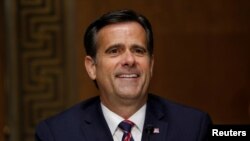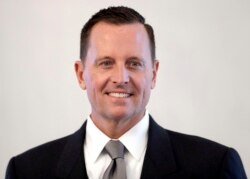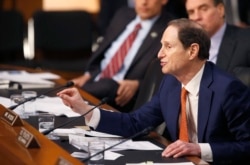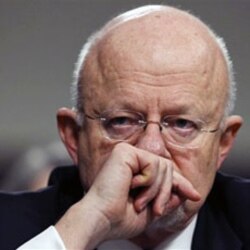More than nine months after U.S. President Donald Trump first floated his name, John Ratcliffe is taking charge of the country’s intelligence operations, promising to live up to the U.S. intelligence community mantra of speaking truth to power, despite his reputation as a Trump loyalist.
The 54-year-old Ratcliffe was sworn in as director of national intelligence on Tuesday, less than a week after winning confirmation in the Senate by a 49-44 vote.
During a White House briefing Tuesday, press secretary Kayleigh McEnany expressed hope Ratcliffe would follow in the path of Richard Grenell, the outgoing U.S. ambassador to Germany, who had been serving as acting director for the past three months.
“Rick Grenell has done an excellent job in that position,” McEnany said. “He's done extraordinary work at ODNI. I expect John Ratcliffe will as he takes over," she added.
In his short time as the acting DNI, Grenell irritated some lawmakers by refusing to consult with them while pushing ahead with a series of reforms, including changes to how the intelligence community will brief on election interference and moves to streamline operations at the National Counterterrorism Center.
In his first statement as director of National Intelligence, Ratcliffe thanked both the president and Grenell, and said he looked forward to leading what he called, “the world's most talented and effective intelligence professionals.”
He also reiterated his promise to provide the president and policymakers with “timely, accurate and objective intelligence.”
During his confirmation hearing earlier this month, Ratcliffe said he hoped to be a stabilizing force for the U.S. intelligence community and pledged his first task would be assessing the political, economic and geopolitical impact of the coronavirus pandemic.
“The American people deserve answers," he told lawmakers. “I pledge that the IC (intelligence community) will remain laser-focused on providing them."
Ratcliffe said other priorities would include China, Russia election interference and Iran’s pursuit of nuclear weapons.
Yet, there have been persistent concerns from critics that Ratcliffe is unfit and unqualified for the job.
“Ratcliffe has proven that his loyalty is to Donald Trump, not the truth,” Democratic senator and Intelligence Committee member Ron Wyden tweeted last week, following Ratcliffe’s Senate confirmation.
“This is yet another unqualified Trump nominee rubber-stamped by (Senate Majority Leader) Mitch McConnell, and a sad day for our democracy,” Wyden added.
Concerns first surfaced last August when the president tweeted his intent to nominate Ratcliffe and caused the Texas lawmaker to withdraw his name from consideration.
Concerns about inexperience, partisanship
Specifically, lawmakers questioned whether Ratcliffe, a former U.S. attorney, had overstated his counterterrorism achievements, and noted that at the time, he had only served on the House Intelligence Committee for six months.
Since then, Republican members of Congress warmed to Ratcliffe’s nomination, satisfied with his assurances that he would not use the U.S. intelligence community to further the president’s political goals.
“This is a very smart person. This is a very serious person. This is a very decent person,” acting chairman of the Senate Intelligence Committee, Republican Marco Rubio, told the Fox News show “Fox and Friends” on Tuesday. “I think Ratcliffe is going to do a great job."
Ratcliffe failed to win over Senate Democrats, who voted unanimously against his confirmation.
"It requires someone with unimpeachable integrity, deep experience and the independence and the backbone to speak truth to power,” Senate Minority Leader Chuck Schumer said before last week’s vote. "Mr. Ratcliffe doesn't even come close to meeting that high bar."
A key concern for Democratic lawmakers has been Ratcliffe’s refusal to wholly endorse the U.S. intelligence community’s findings that Russia interfered in the 2016 U.S. presidential election, with the ultimate aim of helping then-candidate Trump.
During his confirmation hearing earlier this month, Ratcliffe cited a 2018 report by the House Intelligence Committee which concluded Russia did not try to boost Trump’s chances.
“But I have not seen the underlying intelligence to tell me why there is a difference of opinion between the two committees," Ratcliffe said at the time.
Because of such statements, along with Ratcliffe’s previous partisan rhetoric and lack of intelligence experience, some former officials see the potential for trouble ahead.
“The danger is that he will see himself as the direct line to the president and try to avoid passing information the president doesn't want to see,” said John Sipher, a 28-year veteran of the CIA who once ran the agency's Russia operations.
“Likewise, he may come back from meetings with the president armed with crazy ideas and ‘orders,’” Sipher added.
Bringing stability to the IC
Others see a chance for Ratcliffe to provide stability for U.S. intelligence, noting that his main job has less to do with day-to-day operations than it does with keeping the various agencies focused on the tasks at hand.
“It’s about making sure the intelligence community is working efficiently together," said Daniel Hoffman, a retired senior CIA officer with decades of experience. “He needs to work really closely and really well with the agency heads.”
Still, given the frequent clashes between Trump and the intelligence community, some former intelligence officials tell VOA that Ratcliffe might be well-served by reaching out to the different agencies.
James Clapper, who served as DNI under former President Barack Obama and who has been a frequent critic of the Trump administration, said one option would be for Ratcliffe to hold a series of town halls “so he can get to know the agencies, and they him.
“The rank and file are going to watch closely to see what the new DNI does and says,” Clapper said. “I think they’ll want to give him a chance to live up to what he promised during his confirmation hearing."










